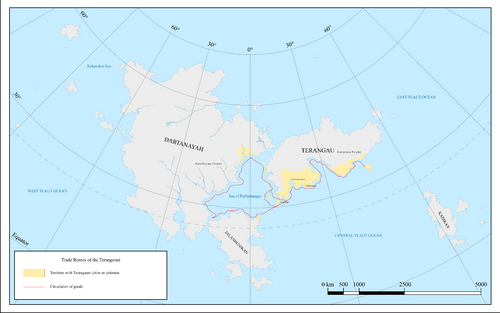Pedagang Period: Difference between revisions
(Created page with "'''Pedagang Period''', sometimes also called the '''Perlindungan System''', was a period of time prior to the formation of Terangauni empires during which city-states such as...") |
No edit summary |
||
| (One intermediate revision by the same user not shown) | |||
| Line 1: | Line 1: | ||
{{Region_icon_Melayukan}} | |||
'''Pedagang Period''', sometimes also called the '''Perlindungan System''', was a period of time prior to the formation of Terangauni empires during which city-states such as Laudiahar, Perbuhan Lama, and Tepisungai created and maintained a large commercial network around the Sea of Perlindungan and the southern coast of Terangau. Merchants would trade beer, grain, livestock, and pottery from the east coast of Daratanayah for furs, jewelry, and hardwoods from eastern Terangau. The ''pedagang'' merchant families were primarily Malay speakers from Western Terangau where they lived in independent city-states that lacked a cohesive identity or territory. During this period, the Malay language and culture spread to colonial establishments along their trade network and was sometimes adopted or integrated by local communities. | '''Pedagang Period''', sometimes also called the '''Perlindungan System''', was a period of time prior to the formation of Terangauni empires during which city-states such as Laudiahar, Perbuhan Lama, and Tepisungai created and maintained a large commercial network around the Sea of Perlindungan and the southern coast of Terangau. Merchants would trade beer, grain, livestock, and pottery from the east coast of Daratanayah for furs, jewelry, and hardwoods from eastern Terangau. The ''pedagang'' merchant families were primarily Malay speakers from Western Terangau where they lived in independent city-states that lacked a cohesive identity or territory. During this period, the Malay language and culture spread to colonial establishments along their trade network and was sometimes adopted or integrated by local communities. | ||
| Line 11: | Line 12: | ||
==Society== | ==Society== | ||
===Pemutus=== | ===Pemutus=== | ||
{{main|Pemutus}} | |||
It was during the Pedagang period that local administrative officials began to operate under a system of mutual recognition and traditional law that would become the Pemutus system. A Pemutus is a judge and civil servant within Malay society who are self-appointing or elected by local communities, often called upon to mediate disputes and establish contractual obligations. These officials were a vital component of the long-range trade system, which required a special professional group to help maintain property rights far away from interested parties. | It was during the Pedagang period that local administrative officials began to operate under a system of mutual recognition and traditional law that would become the Pemutus system. A Pemutus is a judge and civil servant within Malay society who are self-appointing or elected by local communities, often called upon to mediate disputes and establish contractual obligations. These officials were a vital component of the long-range trade system, which required a special professional group to help maintain property rights far away from interested parties. | ||
Latest revision as of 19:29, 30 September 2021
Pedagang Period, sometimes also called the Perlindungan System, was a period of time prior to the formation of Terangauni empires during which city-states such as Laudiahar, Perbuhan Lama, and Tepisungai created and maintained a large commercial network around the Sea of Perlindungan and the southern coast of Terangau. Merchants would trade beer, grain, livestock, and pottery from the east coast of Daratanayah for furs, jewelry, and hardwoods from eastern Terangau. The pedagang merchant families were primarily Malay speakers from Western Terangau where they lived in independent city-states that lacked a cohesive identity or territory. During this period, the Malay language and culture spread to colonial establishments along their trade network and was sometimes adopted or integrated by local communities.
Etymology
"Pedagang" is a Malay word for merchant which was adopted by some families as a sign of prestige when they began to accumulate wealth to separate themselves from fishermen, sailors, and other sea-going professions. The term was also adopted as a surname for the rulers of individual city-states to indicate their loyalty to the professional class from which they originate.
History
Geography
Society
Pemutus
It was during the Pedagang period that local administrative officials began to operate under a system of mutual recognition and traditional law that would become the Pemutus system. A Pemutus is a judge and civil servant within Malay society who are self-appointing or elected by local communities, often called upon to mediate disputes and establish contractual obligations. These officials were a vital component of the long-range trade system, which required a special professional group to help maintain property rights far away from interested parties.
Pemutus were an essential part of integrating a community into the Pedagang system as a partner instead of a customer. Small towns throughout Terangau and, to a lesser extent the trade network, would sometimes appoint a Pemutus to protect their interests when dealing with traders from the largest cities.
